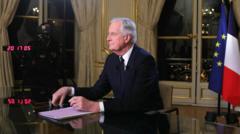Barnier, having taken office just three months ago, emphasized that his desire to stay in power is not a mere matter of political survival. He characterized the current political landscape as unprecedented, stating, "This is the first time since 1958 that there is no majority at all." He called President Emmanuel Macron a "guarantee of stability," dismissing calls for Macron's resignation amid the political turmoil.
Political stability has eluded France since Macron’s call for snap elections, which resulted in a hung parliament. The left-wing alliance holds the most seats, leading to Barnier's appointment to foster stability amidst divisions. However, the prime minister's efforts to enact reforms, particularly in social security, have been hampered by his inability to secure sufficient support in the National Assembly.
The current political climate casts doubt on Barnier's longevity, with predictions indicating he may soon become the shortest-serving prime minister in the Fifth Republic. If he fails to survive the no-confidence vote, he will act as caretaker until Macron appoints a successor, a process that could be lengthy, mirroring previous transitions. As political uncertainty continues to loom, Barnier's leadership remains precarious, reflecting broader challenges that characterize France's current governance landscape.
Political stability has eluded France since Macron’s call for snap elections, which resulted in a hung parliament. The left-wing alliance holds the most seats, leading to Barnier's appointment to foster stability amidst divisions. However, the prime minister's efforts to enact reforms, particularly in social security, have been hampered by his inability to secure sufficient support in the National Assembly.
The current political climate casts doubt on Barnier's longevity, with predictions indicating he may soon become the shortest-serving prime minister in the Fifth Republic. If he fails to survive the no-confidence vote, he will act as caretaker until Macron appoints a successor, a process that could be lengthy, mirroring previous transitions. As political uncertainty continues to loom, Barnier's leadership remains precarious, reflecting broader challenges that characterize France's current governance landscape.


















